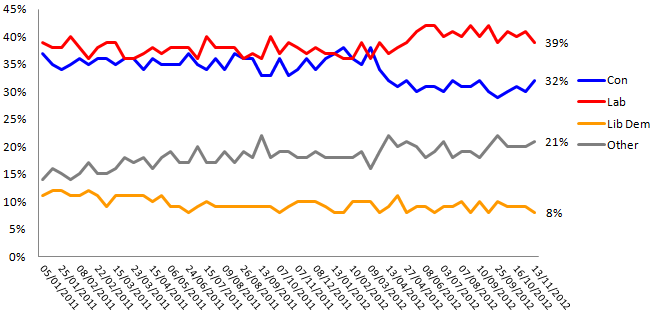Political Polling – 27th November
27th November 2012
While Labour have dropped a point, their lead over the Conservatives has actually increased to 9 points because of the 3 point drop in Conservative support.
In contrast, UKIP have jumped to 13%, their highest figure in an Opinium survey while the Lib Dems remain below the double digit mark with 9%.
- David Cameron and Ed Miliband have both seen drops in their net approval ratings with the prime minister on -15% and the Labour leader on -13%
- Mr Cameron sees a two point drop in the number approving of his performance and a one point increase in the number disapproving while Mr Miliband sees a two point increase in the number disapproving and a one point drop in the number approving
- Nick Clegg?s approval and disapproval figures remain exactly where they were two weeks ago with 15% approving and 58% disapproving giving him a net rating of -43%
This week we asked people whether they thought the government should focus on cutting the deficit or on stimulating economic growth as well as whether the welfare budget has been cut enough.
- The results were very similar to the previous time this question was run (on the 25th September poll) with 43% agreeing that the government should spend more money to stimulate the economy and increase growth even if it means borrowing more in the short term (44% in September) while 33% think that the government should continue to focus on reducing the deficit by cutting public spending (up from 30% in September)
- Again, responses to this question divided largely along party lines with 68% of Labour voters opting for stimulus, 67% of Conservative voters opting for austerity while Lib Dem voters are more closely divided but narrowly in favour of stimulus over austerity
- Cutting the deficit is much more popular among male voters (39%) than female voters (27%)
Respondents were asked whether they agreed or disagreed with the following statement: ?Government spending on welfare has been cut enough and should not be cut further?.
- 53% of likely voters agreed with this statement while 29% disagreed
- While Labour voters firmly agreed with the statement (72%), Conservatives disagreed, albeit more narrowly
- 47% of Conservative voters disagreed with the statement while 31% agreed
Topline Voting Intention
| † | % | Change |
| Conservative | 29 | -3 |
| Labour | 38 | -1 |
| Liberal Democrats | 9 | +1 |
| Other parties | 24 | +3 |
Other Parties (breakdown)
| † | % | Change |
| UKIP | 13 | +3 |
| Green | 3 | n/c |
| SNP | 4 | +1 |
| BNP | 2 | n/c |
| Plaid Cymru | 1 | n/c |
| Other | 1 | n/c |
Approval ratings
| † | % Approve | % Disapprove | Net rating | Net rating (own party) |
| David Cameron | 34% | 49% | -15% | +79% |
| Ed Miliband | 26% | 39% | -13% | +45% |
| Nick Clegg | 15% | 58% | -43% | +48% |


Opinium Research carried out an online survey of 1,949 GB adults aged 18+ from 27th to 29th November 2012. Results have been weighted to nationally representative criteria.
Interview Method and Sample
This survey is conducted online by CAWI (computer aided web interviewing), using Opinium?s online research panel of circa 30,000 individuals. This research is run from a representative sample of GB adults (aged 18+ in England, Scotland and Wales). The sample is scientifically defined from pre-collected registration data containing gender, age (18-34, 35-54, and 55+), region (North East, North West, Yorkshire and Humberside, East Midlands, West Midlands, East of England, London, South East, South West, Wales, and Scotland), working status and social grade to match the latest published ONS figures.
Opinium also takes into account differential response rates from the different demographic groups, to ensure the sample is representative.


